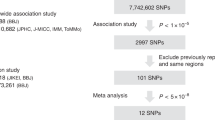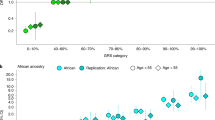Abstract
In search of common risk alleles for prostate cancer that could contribute to high rates of the disease in men of African ancestry, we conducted a genome-wide association study, with 1,047,986 SNP markers examined in 3,425 African-Americans with prostate cancer (cases) and 3,290 African-American male controls. We followed up the most significant 17 new associations from stage 1 in 1,844 cases and 3,269 controls of African ancestry. We identified a new risk variant on chromosome 17q21 (rs7210100, odds ratio per allele = 1.51, P = 3.4 × 10−13). The frequency of the risk allele is ∼5% in men of African descent, whereas it is rare in other populations (<1%). Further studies are needed to investigate the biological contribution of this allele to prostate cancer risk. These findings emphasize the importance of conducting genome-wide association studies in diverse populations.
This is a preview of subscription content, access via your institution
Access options
Subscribe to this journal
Receive 12 print issues and online access
$209.00 per year
only $17.42 per issue
Buy this article
- Purchase on Springer Link
- Instant access to full article PDF
Prices may be subject to local taxes which are calculated during checkout


Similar content being viewed by others
References
Al Olama, A.A. et al. Multiple loci on 8q24 associated with prostate cancer susceptibility. Nat. Genet. 41, 1058–1060 (2009).
Amundadottir, L.T. et al. A common variant associated with prostate cancer in European and African populations. Nat. Genet. 38, 652–658 (2006).
Eeles, R.A. et al. Identification of seven new prostate cancer susceptibility loci through a genome-wide association study. Nat. Genet. 41, 1116–1121 (2009).
Eeles, R.A. et al. Multiple newly identified loci associated with prostate cancer susceptibility. Nat. Genet. 40, 316–321 (2008).
Gudmundsson, J. et al. Genome-wide association and replication studies identify four variants associated with prostate cancer susceptibility. Nat. Genet. 41, 1122–1126 (2009).
Gudmundsson, J. et al. Genome-wide association study identifies a second prostate cancer susceptibility variant at 8q24. Nat. Genet. 39, 631–637 (2007).
Gudmundsson, J. et al. Common sequence variants on 2p15 and Xp11.22 confer susceptibility to prostate cancer. Nat. Genet. 40, 281–283 (2008).
Gudmundsson, J. et al. Two variants on chromosome 17 confer prostate cancer risk, and the one in TCF2 protects against type 2 diabetes. Nat. Genet. 39, 977–983 (2007).
Takata, R. et al. Genome-wide association study identifies five new susceptibility loci for prostate cancer in the Japanese population. Nat. Genet. 42, 751–754 (2010).
Thomas, G. et al. Multiple loci identified in a genome-wide association study of prostate cancer. Nat. Genet. 40, 310–315 (2008).
Yeager, M. et al. Identification of a new prostate cancer susceptibility locus on chromosome 8q24. Nat. Genet. 41, 1055–1057 (2009).
Yeager, M. et al. Genome-wide association study of prostate cancer identifies a second risk locus at 8q24. Nat. Genet. 39, 645–649 (2007).
Freedman, M.L. et al. Admixture mapping identifies 8q24 as a prostate cancer risk locus in African-American men. Proc. Natl. Acad. Sci. USA 103, 14068–14073 (2006).
Haiman, C.A. et al. Multiple regions within 8q24 independently affect risk for prostate cancer. Nat. Genet. 39, 638–644 (2007).
American Cancer Society. Cancer Facts & Figures for African Americans 2009–2010. (American Cancer Society, Atlanta, GA, 2009).
Amann, J.M. et al. ETO, a target of t(8;21) in acute leukemia, makes distinct contacts with multiple histone deacetylases and binds mSin3A through its oligomerization domain. Mol. Cell. Biol. 21, 6470–6483 (2001).
Callen, D.F. et al. Co-expression of the androgen receptor and the transcription factor ZNF652 is related to prostate cancer outcome. Oncol. Rep. 23, 1045–1052 (2010).
Newton-Cheh, C. et al. Genome-wide association study identifies eight loci associated with blood pressure. Nat. Genet. 41, 666–676 (2009).
Price, A.L. et al. Principal components analysis corrects for stratification in genome-wide association studies. Nat. Genet. 38, 904–909 (2006).
Price, A.L. et al. Sensitive detection of chromosomal segments of distinct ancestry in admixed populations. PLoS Genet. 5, e1000519 (2009).
Li, Y., Willer, C., Sanna, S. & Abecasis, G. Genotype imputation. Annu. Rev. Genomics Hum. Genet. 10, 387–406 (2009).
Acknowledgements
The Multiethnic Cohort (MEC) and the genotyping in this study were supported by US National Institutes of Health (NIH) grants CA63464, CA54281, CA1326792, CA148085 and HG004726. Genotyping of the Prostate, Lung, Colorectal and Ovarian Cancer Screening Trial (PLCO) and Ghana samples was funded by the Intramural Research Program of the Division of Cancer Epidemiology and Genetics, National Cancer Institute (NCI), NIH. The Los Angeles Study of Aggressive Prostate Cancer (LAAPC) was funded by grant 99-00524V-10258 from the Cancer Research Fund under Interagency Agreement #97-12013 (University of California contract #98-00924V) with the Department of Health Services Cancer Research Program. Cancer incidence data for the MEC and LAAPC studies have been collected by the Los Angeles Cancer Surveillance Program of the University of Southern California with Federal funds from the NCI, NIH, Department of Health and Human Services under Contract No. N01-PC-35139 and the California Department of Health Services as part of the statewide cancer reporting program mandated by California Health and Safety Code Section 103885 and grant number 1U58DP000807-3 from the Centers for Disease Control and Prevention (CDC). The King County (Washington) Prostate Cancer Study (KCPCS) was supported by NIH grants CA056678, CA082664 and CA092579 with additional support from the Fred Hutchinson Cancer Research Center and the Intramural Program of the National Human Genome Research Institute. Prostate Cancer Case-Control Studies at MD Anderson (MDA) was support by grants CA68578, ES007784, DAMD W81XWH-07-1-0645 and CA140388. The Gene-Environment Interaction in Prostate Cancer Study (GECAP) was supported by NIH grant ES011126. Prostate Cancer Genetics Study (CaP Genes) was supported by CA88164 and CA127298. Identifying Prostate Cancer Genes (IPCG) was supported by Department of Defense (DOD) grant W81XWH-07-1-0122. Case-Control Study of Prostate Cancer among African Americans in Washington, DC (DCPC) was supported by NIH grant S06GM08016 and DOD grants DAMD W81XWH-07-1-0203 and DAMD W81XWH-06-1-0066. The Southern Community Cohort Study (SCCS) is funded by NIH grant CA092447. SCCS sample preparation was conducted at the Epidemiology Biospecimen Core Lab, which is supported in part by the Vanderbilt-Ingram Cancer Center (CA68485). Data on SCCS cancer cases used in this publication were provided by the Alabama Statewide Cancer Registry; Kentucky Cancer Registry; Tennessee Department of Health, Office of Cancer Surveillance; Florida Cancer Data System; North Carolina Central Cancer Registry, North Carolina Division of Public Health; Georgia Comprehensive Cancer Registry; Louisiana Tumor Registry; Mississippi Cancer Registry; South Carolina Central Cancer Registry; Virginia Department of Health, Virginia Cancer Registry; and Arkansas Department of Health, Cancer Registry. The Arkansas Central Cancer Registry is fully funded by a grant from National Program of Cancer Registries, CDC. Data on SCCS cancer cases from Mississippi were collected by the Mississippi Cancer Registry, which participates in the National Program of Cancer Registries (NPCR) of the CDC. The contents of this publication are solely the responsibility of the authors and do not necessarily represent the official views of the CDC or the Mississippi Cancer Registry. We thank C. Edlund from the University of Southern California (USC) Genomics Core for his technical and informatics assistance. The authors thank C. Berg and P. Prorok, Division of Cancer Prevention, NCI, the screening center investigators and staff of the PLCO Cancer Screening Trial, T. Riley and staff at Information Management Services, Inc. and B. O'Brien and staff at Westat, Inc. for their contributions to the PLCO Cancer Screening Trial. We also acknowledge the technical support of M. Gielzak and G. Yan. The authors would like to thank E. Tay and V. Okyne for their expert help in coordinating the Ghana study; A. DeMarzo and G. Netto of Johns Hopkins University for pathology review; V. Devairakkam, N. Kim and J. Heinrich of Research Triangle Institute (RTI) for their expert study management; and S. Niwa and A. Truelove of Westat for study support and data management. The Washington University Prostate Cancer Study (WUPCS) was supported by CA112028, the St. Louis Men's Group Against Cancer and the David H. Nickerson Foundation. The San Francisco Bay Area Prostate Cancer Study (SFPCS) was funded by grant 99-00527V-10182 from the California Cancer Research Program. The Study of Clinical Outcomes, Risk and Ethnicity (SCORE) was supported by CA085074 and CA105641, as well as a grant from the Commonwealth of Pennsylvania. The Cancer Prevention Study II Nutrition Cohort (CPS-II) is supported by the American Cancer Society. Prostate Cancer in a Black Population (PCBP) was supported by grant CA114379 (NCI) and contract N01-HG-25487 (National Health Genome Research Institute and the Office of Minority Health).
Author information
Authors and Affiliations
Contributions
C.A.H., D.O.S. and B.E.H. contributed to the study concept and design. L.C.P., E.N.C., E.R.D., L.Y.X., D.V.D.B., S.J.C., C.A.H. and X.S. supervised the laboratory analyses and quality control. G.K.C., P.W. and D.O.S. contributed to the statistical analysis. C.A.H. wrote the manuscript. W.J.B., S.S.S., S.I.B., R.A.K., B.A.R., W.B.I., S.A.I., J.L.S., W.R.D., J.S.W., A.W.H., B.N., T.R.R., K.A.C., J.X., A.S.K., J.J.H., E.M.J., S.M.G., S.W., L.B.S., R.B.H., Z.W., E.Y., Y.T., Q.C., S.K., E.A.O., C.Z.-J., Y.Y., C.N.-D., J.H.-M., W.W., V.T., G.O.A., A.M., B.-L.C., S.L.Z., M.C.L., S.-Y.W., A.M.R., A.J.M.H., M.J.T., J.C., G.C., I.C., K.R.M., F.S., L.L.M., L.N.K. and B.E.H. conducted the epidemiologic studies that contributed to the scan. All authors helped in the interpretation and discussion of the findings and approved the manuscript.
Corresponding author
Ethics declarations
Competing interests
The authors declare no competing financial interests.
Supplementary information
Supplementary Text and Figures
Supplementary Tables 1–5, Supplementary Figures 1–3 and Supplementary Note. (PDF 520 kb)
Rights and permissions
About this article
Cite this article
Haiman, C., Chen, G., Blot, W. et al. Genome-wide association study of prostate cancer in men of African ancestry identifies a susceptibility locus at 17q21. Nat Genet 43, 570–573 (2011). https://doi.org/10.1038/ng.839
Received:
Accepted:
Published:
Issue Date:
DOI: https://doi.org/10.1038/ng.839
This article is cited by
-
The comparison of cancer gene mutation frequencies in Chinese and U.S. patient populations
Nature Communications (2022)
-
Stigma, beliefs and perceptions regarding prostate cancer among Black and Latino men and women
BMC Public Health (2021)
-
The burden of prostate cancer in Trinidad and Tobago: one of the highest mortality rates in the world
Cancer Causes & Control (2018)
-
Association analyses of more than 140,000 men identify 63 new prostate cancer susceptibility loci
Nature Genetics (2018)
-
Clustering of 770,000 genomes reveals post-colonial population structure of North America
Nature Communications (2017)



